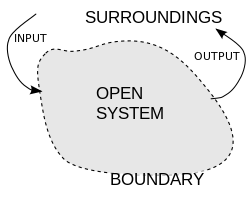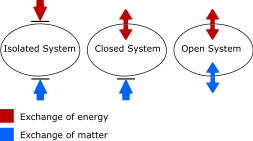
Back نظام مفتوح (نظرية النظم) Arabic Sistema obert (teoria de sistemes) Catalan Otevřená soustava Czech Offenes System German Sistema abierto Spanish Avatud süsteem ET سامانه باز FA Avoin järjestelmä Finnish Système ouvert French Sistem terbuka ID

An open system is a system that has external interactions. Such interactions can take the form of information, energy, or material transfers into or out of the system boundary, depending on the discipline which defines the concept. An open system is contrasted with the concept of an isolated system which exchanges neither energy, matter, nor information with its environment. An open system is also known as a flow system.
The concept of an open system was formalized within a framework that enabled one to interrelate the theory of the organism, thermodynamics, and evolutionary theory.[1] This concept was expanded upon with the advent of information theory and subsequently systems theory. Today the concept has its applications in the natural and social sciences.

In the natural sciences an open system is one whose border is permeable to both energy and mass.[2] By contrast, a closed system is permeable to energy but not to matter.
The definition of an open system assumes that there are supplies of energy that cannot be depleted; in practice, this energy is supplied from some source in the surrounding environment, which can be treated as infinite for the purposes of study. One type of open system is the radiant energy system, which receives its energy from solar radiation – an energy source that can be regarded as inexhaustible for all practical purposes.
- ^ Luhmann, Niklas. Social Systems. Stanford: Stanford University Press, 1995; pp. 6-7
- ^ Glossary Archived 2007-08-17 at the Wayback Machine Maxwell Demon, 1998.